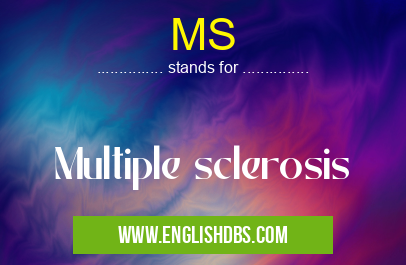What does MS mean in HEALTHCARE
MS stands for multiple sclerosis, a chronic, unpredictable neurological disorder that affects the central nervous system. MS can cause a range of physical, psychological and cognitive symptoms, including extreme fatigue, difficulty walking, impaired coordination and balance, blurred vision and memory loss. Currently there is no cure for MS; however, treatments exist to manage symptoms and slow its progression.

MS meaning in Healthcare in Medical
MS mostly used in an acronym Healthcare in Category Medical that means Multiple sclerosis
Shorthand: MS,
Full Form: Multiple sclerosis
For more information of "Multiple sclerosis", see the section below.
» Medical » Healthcare
MS Full Form
The full form of MS is multiple sclerosis (MS). Multiple sclerosis is a potentially disabling disease of the brain and spinal cord (central nervous system). In MS, the immune system attacks the protective sheath (myelin) that covers nerve fibers and causes communication problems between your brain and the rest of your body. Eventually, this damage may produce symptoms such as visual disturbances, lack of balance, poor coordination, slurred speech impaired memory and concentration, paralysis, numbness or tremors. While there is no cure for MS currently available treatments exist to reduce relapses help manage symptoms and slow progression of disability over time.
Essential Questions and Answers on Multiple sclerosis in "MEDICAL»HEALTHCARE"
What is Multiple Sclerosis (MS)?
Multiple sclerosis (MS) is an autoimmune disorder that affects the central nervous system. It occurs when the body attacks its own myelin sheath, which is a protective coating around the nerves. The damage to the myelin sheath can cause problems in how the brain communicates with other parts of the body, including problems with feeling, movement, and thought processes.
What are some of the common symptoms of MS?
Some of the most common symptoms of MS include fatigue, visual disturbances, coordination issues, muscle spasms and weakness, cognitive changes, and emotional changes.
How is MS diagnosed?
An accurate MS diagnosis typically involves a combination of medical tests such as blood work to look for abnormal antibodies in your blood sample; magnetic resonance imaging (MRI) scans or evoked potential tests to assess nerve damage; lumbar puncture to measure levels of chemicals known as proteins; and physical exams that assess mobility and strength.
Are there treatments available for MS?
Yes, while there is no cure for multiple sclerosis yet, there are numerous treatments available to help slow down disease progression and manage symptoms. Treatments may include medications that reduce inflammation or boost immune system functioning as well as lifestyle modifications such as maintaining a healthy diet or exercising regularly. Depending on how advanced your disease is, you may also require physical therapy or occupational therapy.
How can I find out more about living with MS?
There are several resources available online and offline that provide information about living with multiple sclerosis such as support groups both online and in-person where you can learn from others with similar experiences; websites dedicated to providing resources on topics like nutrition and exercise specifically related to MS; blogs written by people living with MS; educational workshops put on by organizations like the National Multiple Sclerosis Society; patient education services offered at hospitals or clinics dedicated for people with neurological conditions; and books written by both physicians and patients regarding living with this condition.
Is it possible to prevent MS?
Unfortunately, there are currently no known ways to prevent multiple sclerosis from developing in someone who has not been diagnosed yet. However measures such as eating a balanced diet rich in anti-inflammatory foods may help reduce flares up during symptom onset phase – but whether this will have any long-term protective effects is still unclear at this time.
Who should I talk to if I have concerns about my condition?
It’s always best to speak directly with your doctor when it comes to any health concerns that you may have regarding your condition or its management plan so they can provide you with personalized advice regarding your specific situation. If you feel like you need additional support services on top of what your primary care provider offers then don't hesitate to ask them for recommendations so you can find help tailored towards managing daily life challenges associated with multiple sclerosis.
Does having higher stress levels make my condition worse?
Stressful situations can exacerbate certain symptoms associated with multiple sclerosis however not everyone reacts in the same way upon exposure to stress – it all depends on individual factors such as age, lifestyle habits prior diagnosis etc… Coping strategies such as relaxation techniques or mindfulness practices may help minimize some of these short term side effects.
Final Words:
Multiple sclerosis (MS) is an unpredictable neurological disorder that affects the central nervous system. It has no known cause but it’s believed that certain genetic factors may increase one's risk for developing it. Common symptoms experienced by those with MS can range from mild to severe depending on which nerves have been affected by myelin damage caused by this condition. Treatment options are available but unfortunately there is still not yet a cure for this progressive auto-immune disorder which can have long-lasting effects on one's health and daily life activities.
MS also stands for: |
|
| All stands for MS |
